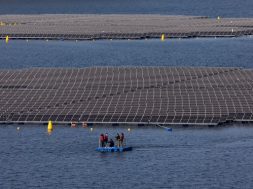
Blockchain Solving The Energy Crisis In Africa
Blockchain technology’s use of a non corruptible ledger brings an exciting change to the future of the energy industry. Like other Ethereum networks, cities will utilize Smart Grids to have an online register that stores all the information running through a municipality. This decentralization of data will give consumers total over where they source their energy. Earlier this month, the website reported on WePower’s success, with their blockchain project in Estonia. South Africa is another country that is experimenting with an incorruptible ledger and completing peer-to-peer energy trading.
Africa Pushing for Blockchain Technology
Not long ago it was thought to be almost impossible to develop a consumer driven energy market in Africa. However cities like Cape Town and Cairo are looking to change this narrative. Just this year, the South African city hosted the Blockchain & AI Africa Conference where they discussed exactly how blockchain can assist the continent in achieving the UN’s sustainable development goals for economic growth. South Africa has a distinct advantage as being a test subject for this new peer-to-peer trading with an incorruptible ledger because the climate is often sunny.
Sun Exchange
There is a company worth highlighting, Sun Exchange, that is the main driver behind peer-to-peer trading coming to the sub saharan nation. The company crowdfunds the construction of solar panels through cryptocurrency investments. In fact, the last two years Sun Exchange received over $1.4 million in seed funding. Once they approve an installation project, Sun Exchange then sells individual cells of the solar panel for $6. Then in order for the system to be completely installed, they must sell all the solar panels. From a buyer’s perspective, they can expect to receive payment for 20 years. During this period, they will earn an average income of about 10% of their total investments per year.
Sun Exchange exist because the South African government does not subsidize the construction of solar panels and they hope to connect foreigners that want to sell excess energy to schools and businesses. Their initial project began in 2016 with supplying energy to a South African school. In three years, the company has grown steadily to a manageable size. More than 9,000 people in 145 countries are signed up on the company’s platform as buyers or leasers. Its 580,000 solar cells power over 1 megawatt of solar panels at 14 locations. They are even a profitable organization because last year they were successful in generating over $700,000 in revenue.
Advantages for Developing Nations
It is important to note that these grand technological changes will most likely come from developing nations. This includes Estonia or South Africa. A change in the West’s electricity grid takes up to 25 years due to the utility institutions already set in place. On the other hand, developing nations have an advantage because their disconnected and rural populations can make the switch to smart grid technology more efficiently. A perfect example of this is the Knysna Elephant Park in South Africa where Sun Exchange sold 23,248 solar cells.

















